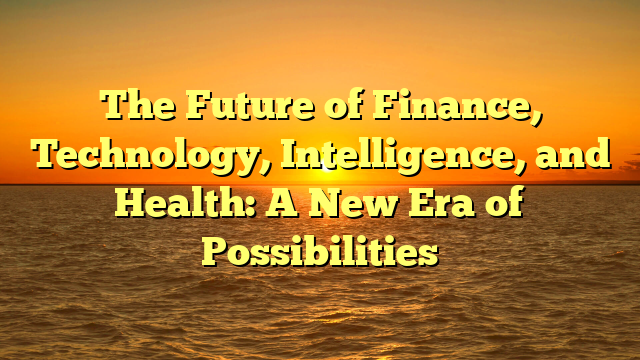—
Today’s rapidly changing landscape in financial systems, technology, artificial intelligence, and health reveals the increasing overlap of these fields. These areas are shaping the future in ways that were once unimaginable. This article explores how each of these sectors is evolving and how they influence one another.
1. The Evolution of Finance
As technology reshapes global finance, innovations such as blockchain and AI are playing pivotal roles in the transition to more decentralized financial systems. This transformation is enhancing transparency, reducing transaction costs, and empowering individuals and businesses to manage their financial affairs more effectively. Financial inclusion is improving, and new models of economic cooperation are emerging.
In particular, the advent of artificial intelligence has played a critical role in the financial sector, with AI algorithms being used to make better investment decisions, automate trading processes, and detect fraudulent activities. Machine learning is also being used to improve predictive analytics, offering businesses and individuals insights into market trends and financial opportunities. These AI-driven solutions are enabling financial institutions to operate more efficiently and accurately.
2. Technology’s Impact on Society
Technology continues to be the driving force behind the rapid changes across all industries, including finance, healthcare, and beyond. In particular, the development of artificial intelligence, data analytics, and IoT devices is transforming how businesses operate and how people interact with the world. From smart homes to automated factories, technology is making our lives more convenient, efficient, and connected. As new technologies evolve, it is clear that they will play an even greater role in shaping our future.
AI is also being leveraged in industries like healthcare, where it’s being used for everything from diagnostic tools to personalized treatment plans. Wearables such as health monitors are allowing individuals to take greater control of their health by providing real-time data about their physical condition. In the near future, the role of technology in healthcare will only grow, making treatments more personalized and accessible.
The Rise of AI and Its Impact
Artificial Intelligence (AI) is revolutionizing many sectors, including finance, healthcare, and even education. mix parlay bangsawan88 is becoming increasingly central in many industries. Whether through data-driven insights in finance or advanced diagnostic systems in healthcare, AI is enhancing capabilities and transforming the way businesses operate. The future of AI will likely involve even more integrated and sophisticated systems.
In healthcare, AI applications are expanding rapidly, ranging from predictive analytics for patient outcomes to virtual healthcare assistants that help manage patient care. These advancements are improving the quality of care while reducing operational costs. In finance, AI-driven systems are also enabling more precise fraud detection and credit scoring, making the financial sector safer and more reliable.
How Technology is Improving Health Outcomes
Telemedicine and remote healthcare services are making it easier for patients to receive medical care from the comfort of their homes. This shift is particularly important for individuals in rural or underserved areas where access to healthcare facilities may be limited. As technology continues to evolve, so too will the quality and availability of healthcare services.
With the integration of AI and big data, healthcare providers are now able to offer more personalized treatment plans that are tailored to individual needs. AI-driven tools are being used for everything from early cancer detection to personalized fitness and diet plans. These technologies are not just improving treatments but also reducing costs and making healthcare more accessible for all.
Conclusion
In conclusion, the convergence of finance, innovative solutions, AI-driven systems, and health is creating a world full of exciting possibilities. As these sectors continue to evolve, they will offer new opportunities for businesses, governments, and individuals to grow, innovate, and improve lives. The future holds promise for more integrated, efficient, and accessible systems in all areas, ultimately driving economic growth, improving health outcomes, and enhancing quality of life.
We are standing on the brink of a new era, where the power of technology and data will drive progress in finance, healthcare, and beyond. As we embrace these innovations, it is crucial to consider their ethical implications and ensure that the benefits are distributed equitably. The convergence of these fields holds tremendous potential, and the choices we make today will shape the world of tomorrow.
